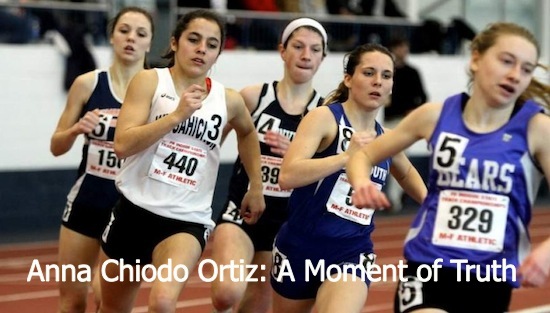Anna Chiodo Ortiz was recognized as a Univest Featured Athlete last spring, and the Wissahickon graduate returns to share her battle – and ultimate triumph over – an eating disorder in a follow-up article sponsored by Univest. Check out Univest’s services by visiting the web site www.univest.net. Photos provided courtesy of Patty Morgan Photography.

Anna Chiodo Ortiz: A Moment of Truth
By GORDON GLANTZ
Five hundred words.
That’s all Anna Chiodo Ortiz had to explain the most defining personal journey of her first 18 years on the planet, her trials and tribulations – and ultimate triumph over – an eating disorder that began at Wissahickon Middle School and was not conquered until at Wissahickon High.
The battle tested the fabric of her tight-knit family and was also known within the three-sport athlete’s inner circle of friends, but now she was about to go public to the school community.
There was no turning back.
Her AP Literature teacher, Melissa Perlman, served as her mentor through the process, coaxing and coaching her to what was the moment of truth – sharing her “This I Believe” essay with the class (and a few visitors -- including the principal, Lynn Fields, and other students sitting in).
Chiodo Ortiz had volunteered to go last but was starting to regret the choice.
“I was tearing up the entire class,” said Chiodo Ortiz, now a freshman at Bucknell University, where she will run for the track team. “I was just so nervous. My teacher made eye contact with me before I presented and told me that it was going to be OK. I got up to the front of the class and immediately started crying. I cried through the entire presentation, but it was one of the most memorable moments of my high school career.”
There was no holding back, no sugar-coating, in her essay.
Many were seeing their classmate known for infectious spirit and sincere smile reveal another side of who she is for the first time, as she relayed looking at herself in the mirror -- with bloodshot eyes and gaunt face -- after purging.
She took her senior classmates back to ninth grade. At the time, Chiodo Ortiz had already battled anorexia a year earlier. Aware that she was losing self-control but unable to comprehend it until a teacher spoke about the long-term health impact eating disorders have on young women.
“That’s when I really started to think,” she told the class. “Every thought led to another. Did I want to continue to despise my (twin) brother for telling on me whenever I would take something out of my lunch behind my mom’s back? Did I want to keep setting this example for my little sister, who idolizes me, and would put candies by my bedside with hopes that I would eat it? Did I want to keep sneaking upstairs to throw up my dinner, or keeping lying about the scabs I had on my knuckles from when they would rub against my teeth as I was purging?”
The answer was no.
She confessed her relapse to her mother, Ann, who was “exceptionally upset” because the family was convinced she was on the road to recovery from anorexia. Chiodo Ortiz received professional help for her bulimia and the real road to recovery began.
Chiodo Ortiz admits that she “still has her moments,” but she has the resources – the support system and the self-awareness – to get past them.
Perhaps the final hurdle was the 500 words of her “This I Believe” essay.
Word spread of the presentation to the extent that a recent Wissahickon grad with a similar story reached out to her on Facebook with words of encouragement.
A similar interaction played in person.
For the track star, the race was won when a classmate approached her. For all those times she felt alone, she realized that was never the case.
“That day-- later in the bathroom -- a girl came up to me and told me how amazing my essay was, and how she really appreciated me telling my story because she had dealt with similar things in the past,” said Chiodo Ortiz. “She gave me a hug and I told her if she ever needed anything I was here to talk, and she said the same in return. That right there made it all worth it. Even just one person. The fact that sharing my story was able to help her in the littlest bit, made me thankful that I had written about my eating disorder.”
The Human Toll
The NEDA – National Eating Disorders Association – reveals some staggering statistics about anorexia, bulimia and other related issues, which affect 10 percent of young women while over half of teen girls engage in some form of unhealthy eating habits that include skipping meals and fasting.
Unlike Chiodo Ortiz, who was able to get help through therapy, as little as three percent – and only as much 28 percent – seek that avenue.
While both genders are affected, studies show that girls express concerns about weight by the tender age of six and 40 to 60 percent admit to worrying about being overweight by the age of 12.
It is not hard to understand when a study showed that 69 percent of elementary school girls admit to forming their opinions of body image from the magazines they read.
Turn on the television? The average Miss America is 5-7, 121 pounds, according to NEDA.
While pinpointing the exact number of eating disorders is difficult, they have steadily increased since 1950. For females between the ages of 15 and 25, the mortality rate from eating disorders is 12 times higher than all other causes of death.
It is easy to understand why since anorexia can and will slow the heart rate and blood pressure to dangerous levels. It will inevitably lead to muscle loss, weakness, fainting/fatigue and dehydration/kidney failure.
Bulimia, which tripled between the years of 1988 and 1993, creates electrolyte imbalances and the enhanced potential for gastric rupture. The repeated vomiting damages the esophagus, often seriously and permanently.
Other concerns range from tooth decay to ulcers to pancreatitis.
Having dealt with both, Chiodo Ortiz realizes she was walking on a high wire without a safety net. She acknowledges the numbers and does not dispute them, but they leave her unmoved. That might change as the years pass and she has more time to reflect with some measure of objectivity, but she is still making sense of the human toll of an eating disorder.
There were the cat-and-mouse games with her mother, Ann. There was the resentment of her twin brother, Alex. And there was the unforgettable image of disappointment in the eyes of her younger sister, Sophia.
And her father, Jorge, and older brother, Chris, who will be on campus at Bucknell, were not above the impact of what was a full-scale family crisis.
“The years of my eating disorder were very difficult on my entire family,” she said. “I consider my mom one of my best friends, and my eating disorder was ruining our relationship. My family just wanted the best for me, but I failed to see that as I was in denial that I had a problem for the longest time.
“My brother wouldn't necessarily watch me at lunch, but he kept a close eye at me at home, (watching) if I took a snack out of my lunch before school behind my mom's back. He always told my mom if he saw me do something like that, or if he thought I still looked too skinny. He was looking out for me, and I took that for granted, but now I am so blessed and thankful to have him along with the rest of my family.”
The Voice Within
Sports were always a big part of Chiodo Ortiz’s life. She attended Blue Bell Elementary in first grade before her family moved to Texas due to her father’s job. There, she began her athletic odyssey with gymnastics and added soccer, which she is heartsick over giving up at Bucknell.
She returned to the area in sixth grade, in time for middle school, and continued with sports. As track revealed itself as her ticket to the next level, she focused on it in the indoor (winter) and outdoor (spring) seasons and gave up a one-year try at diving after her freshman year.
She is not 100 percent sure how she stayed properly hydrated and nourished for matches and meets, but she seemed to have an inner voice telling her she should follow something resembling protocol on those days.
Because she was athletic, she never dealt with issues of being overweight. She is not an aberration. The NEDA reports that one in three teen girls with eating disorders were not overweight at the outset. However, in the oft-harsh middle school environment, the struggle to get noticed during a time when self-esteem issues are in peril may have led to her eating disorder.
“Yeah, in middle school people were telling me how skinny I looked, and they would also say it to my mom,” she said. “I liked the attention I was getting, which is strange because I have never considered myself ‘invisible’ or anything like that. There should've been no reason I loved that attention so much.”
While noting that “girls can be cattie,” she now is convinced that most students in that environment are more concerned with what others think of them than spending time actually thinking about others.
That is even less the case in high school, where it becomes easier to find a niche and comfort zone. She trusts that at Bucknell students are going to be into their own worlds so much that the trend will continue.
While she says that Bucknell’s campus being 2 ½ hours from home is “the perfect distance,” it may be a bit too far to play the role of immediate mentor for Sophia.
While Alex is her twin, her younger sister is her mirror image.
And she is now a middle-schooler.
“I love my little sister with all of my heart,” said Chiodo Ortiz. “Knowing that, for years, I was setting such a poor example for her absolutely kills me. Sure she didn't really know too much of what was going on at the time, but that's just it. As young children, and even throughout our life, we are learning every day. And even though she didn't know the depth of my eating disorder, she still watched me every time I cried and refused to eat my dinner, every time my parents would be angry at me for not eating, and so many other moments as well.
“I am so beyond lucky that she is the way she is today, and that my eating disorder didn't have more of a negative impact on her. However, she is in middle school now, and I feel as though middle school is the toughest years on teenage girls -- in respect to caring so much about what people think. It is natural, of course, to be aware of what those around you are thinking. But, in my opinion, it takes true maturity to brush it off and be happy with yourself and who you are. Recently, I noticed my sister falling into that middle school trap. I try and tell her every day that it doesn't matter, and what girls say doesn't matter in the big picture. No one cares what you wear. No one – at least no one who matters -- cares about your hair color, your weight, etc.”
But when you are in the moment of crossing a bridge from elementary school to high school, it is a time when compliments can go a long way,
“Every girl likes to hear they look skinny,” she said. “It makes you feel good, so when I heard those words, my eating disorder went a little more to the extreme. It was like ‘Oh, I definitely can't eat now. I can't gain weight. I have to stay skinny.’”
And despite being exposed to plenty of rational thought, the world was spinning fast and she could not keep pace.
Turns out, the words of others, including those closest, did not match the impact of the voice within.
“My mom told me throughout my entire eating disorder about the impact everything could have on my future health,” said Chiodo Ortiz. “I always knew she was right, deep down, but I didn't think any of it would actually affect me. I didn't think I wouldn't be able to have babies. So, I do think it came with a level maturity to fully understand and grasp those facts, and it all definitely became clearer through therapy.”
What also became more crystalized was that the root causes of her eating disorders could not all be laid at the doorstep of Wissahickon Middle School and its social culture.
There was pressure over getting good grades, which would have been the case at any school, and an undercurrent of issues about control.
“I guess it was not having great control of my grades at the time, and several other things coming into play,” she explained. “But being in middle school definitely didn't help. I became so obsessed with how I looked every day, constantly comparing myself to, literally, every other girl I saw. Then, when I was purging, that was around high school time, which is a whole new transition with soccer tryouts, newer people, more school work, etc. It was like my body is what I knew, subconsciously, I could control. It spiraled when I felt as though I was losing that control. It’s so hard to put into words.
“I don’t want people to think the reason for my eating disorder was because of middle school girls and wanting to fit in, because that wasn't entirely the main reason. It definitely played a part, but to go along with other stats probably, eating disorders occur when someone feels as though they lack control somewhere in their life. I still don't know to this day what the main cause of it was, but I know that it consumed every thought in my head up until therapy.”
Feeling ‘Lucky’
After recording 40 tackles in 17 games for the soccer team as an all-league center back her senior year, Chiodo Ortiz went into her final high school track season with high hopes.
Reality hit with a thud, as the talent of District 1 kept her from the state meet. She needed to finish in the top eight in the 800 in the district. She came in ninth. The 4x400 relay team also came up short of a return trip to states, but placed a solid No. 11 in a District where 17 schools ran the qualifying time just on the preliminary day of the meet.
As it was, while not all goals were achieved, Chiodo Ortiz soaked up every moment of her final year.
“My senior season went pretty well, although it ended sooner than I would've liked,” she said. “I was happy to make it into the district final for the 800, especially because District 1 is so incredibly talented, but I really wanted to qualify for states.
“As for relays, we did really well. Last year 2014 we went to states in the 4x400. But we were happy with our season best, 3:58.67, especially with our anchor leg running sick as a dog. That’s Lotte Black. She rocks.”
When she talks glowingly about teammates, like Black, it is genuine.
That explains why Chiodo Ortiz’s resume includes being a two-year captain for the soccer team and the indoor and outdoor track teams.
That’s speaks to her leadership skills, and her willingness to set an example.
In many ways, that extended to Perlman’s classroom that fateful day. She prepared like a runner for the big meet and came out a winner.
She knew this right away.
“After I finished, students raised their hands and gave me feedback about my essay and my strength,” she said. “Even our principal had nice words to say. The feeling was like no other, having the support from the students and adults around me. My goal of the essay, like I said, was to reach out to girls or people who may be going through something whether it's an eating disorder, or just something difficult.
“Overall, the experience has been great. Before I wrote the essay, I was definitely nervous with writing about my eating disorder. I kind of knew all year that that is what I wanted my ‘This I Believe’ essay to be about, but when it came down to it, part of me didn't want to share it. I was scared with how people would react, for very few of my friends knew about it. My teacher, Mrs. Perlman, really encouraged me to write the essay. She was so awesome when working with me, and I am so happy she got me to write my essay about my eating disorder. I also wrote my college essay on it, so she had known about it prior to the ‘This I Believe’ essay and knew it was a powerful topic.
“While writing the essay, it was actually pretty difficult. I had to squeeze my experience, my feelings, my relationships, and my goal of the essay all into 500 words. I struggled with the focus for a while, going on tangents about my eating disorder that I later found wasn't going to be productive in the essay. Eventually, with the help of my teacher, I was able to really describe the most important parts of my eating disorder, the moments and feelings that stand out the most in my mind. I am really proud with how the essay turned out, it's powerful and engaging and intense, yet soft and heartfelt.”
The final leg of the race was when students had a chance to interact on the school’s Moodle site. Chiodo Ortiz had reservations, fully aware that written reaction could be different – and possibly insensitive and cruel – than the immediate feedback she received.
Instead, she received more encouragement.
“The feedback I got on Moodle was incredible,” she said. “From best friends, to friends, to just classmates, everyone was so incredibly supportive and only had positive things to say about my essay and about my eating disorder. Friends texted me saying how proud they were of me for sharing my story, and I am so blessed to be able to share my story to such an accepting group of students. The day I had to present my essay was an emotional one. I was the very last one to go for my class, and before the day came I didn't think it would be that difficult to read my essay in front of my peers and share my story.
“I am very lucky to have grown up mostly in Wissahickon. I feel as though it has been an accepting community -- especially in the high school. There will always be judgments and judgmental people but, overall, Wissahickon is a very accepting environment. No one deserves to feel insecure, especially by other people. It frustrates me when people are so caught up in others’ opinions, when they are truly loved for themselves by those who matter. It's hard to tell a middle school girl that, and now I sort of get a feeling -- obviously not near that extreme -- of how frustrating it was for my family to try and break through my barrier.”
Although it is all in her recent past, Chiodo Ortiz is not quickly forgetting. While she will enter Bucknell as an undecided major, she is considering a double major in psychology and nutrition.
“I am looking to get involved on campus here with helping around with the counselors and sports nutritionists,” she said. “I want to make sure the purpose of sharing about my eating disorder to help people is clear. And that I’m huge with taking care of your body and keeping it healthy, as well as loving yourself. If you’re working hard and taking care of yourself you should feel beautiful.”

- Log in to post comments


